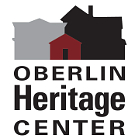Accessibility and ADA
On this page:
- Arrival and Parking
- Tours of the Museum
- History Walks
- Sensory Stories and Other Programs for Visitors with Special Needs
- Service Dog Policy
- Restrooms and Accessibility
- Other Programs and Events
The Oberlin Heritage Center seeks to ensure that all visitors feel welcome on the museum campus and that all interested people may access high quality programming about Oberlin’s rich history. Below you will find information about the accessibility of OHC buildings and current program offerings to help you plan your visit. Due to the historic nature of our buildings, some areas are not currently accessible to visitors using wheelchairs. In the coming years, OHC has committed to improving our ability to provide all visitors with an equitable experience.
If you have any questions related to the accessibility of programs or buildings, please contact Amanda Manahan, Museum Education and Tour Coordinator, at (440) 774-1700 or email [email protected]. We are happy to modify tours and/or make special arrangements if contacted ahead of time.
Arrival and Parking

Click to Download PDF of Map
The Oberlin Heritage Center provides a drop-off zone in front of the Monroe House. To access this area, please enter the Oberlin Conservatory of Music parking lot from South Professor Street, and proceed to the front of the Monroe House. There are curb cuts in this area that can assist with wheelchair or walker access to the sidewalk. Unfortunately, museum guests are not permitted to park in the Conservatory’s lot. After drop off, please proceed back through the Conservatory parking lot to exit and turn left onto South Professor Street, then turn left onto West Vine Street. Our parking entrance is at 20 West Vine Street (see map above).
Our front entrance has 3 ½ steps to the front door. We do have an accessible entrance at the side of the Monroe House, which is indicated on the map above.
To help you plan your arrival, it is:
- 23 ft plus 3 ½ steps from the Drop-Off Zone to the front door of the Monroe House.
- 46 ft from the Drop-Off Zone to the accessible entrance.
- 110 ft from the OHC parking lot to our accessible entrance.
- 170 ft from the OHC parking lot to the front door of the Monroe House.
Tours of the Museum
Please note that, at this time, some areas of the historic buildings are not wheelchair accessible. Visitors using wheelchairs can enter and tour the first floor of the Monroe House as well as the Little Red Schoolhouse, and most doorways in these buildings are at least 30” wide. At this time, Jewett House does not have a wheelchair-accessible entrance.
All tours in OHC buildings, with the exception of some special events, are guided tours. The Upstairs/Downstairs Tour, which includes all three of our historic buildings, lasts between 75 and 90 minutes and involves walking short distances between buildings (approximately 335 ft total), climbing stairs within buildings, and periods of standing. However, seating is available in almost all rooms so that visitors may rest as needed.
If visitors are unable to climb stairs, docents can provide materials that illustrate architecture and furnishings of the upstairs areas. Visitors may also opt for the Sneak Peek tour, which includes only the first floor of the Monroe house (which is wheelchair accessible) and lasts about 30 minutes.
For visitors who are deaf or hard of hearing, staff can provide written complements to the spoken components of the guided tours, and if requested, docents can wear a portable microphone to assist.
For visitors who are blind or have low vision, staff can provide some large print written materials to complement the tour, and docents are trained to describe objects throughout the museum to assist with a positive visitor experience. During the tour, especially in the Little Red Schoolhouse, hands-on experiences with historic artifacts can be provided.
History Walks
History Walks are accessible to visitors using wheelchairs and rollators, barring poor weather conditions. Most tours cover about 7/10 of a mile through downtown Oberlin and on Oberlin Heritage Center property, and they last between 75 and 90 minutes. Restrooms and seating are limited on history walks, and guests are encouraged to call ahead for details.
Visitors who are deaf or hard of hearing may have difficulty hearing the tour guide over background noise from the town and the streets, and may prefer to explore the historic downtown district or Oberlin’s abolitionist history through a Tablet Tour.
Sensory Stories and Other Programs for Visitors with Special Needs
OHC continues to add programs and tours to better serve interested audiences, and we welcome suggestions and requests for tailored programs and tours. If we do not currently offer an onsite program that meets your needs, we can also travel to your location with an Outreach Program.
Service Dogs
Certified service animals or service animals-in-training are welcome in the museum when utilized for assisted care. For more information, see the Oberlin Heritage Center's Policies on the Presence of Animals document.
Restrooms
We recommend that visitors plan to use the restroom before visiting the Oberlin Heritage Center. We have minimal restroom facilities that are not fully accessible.
Other Programs and Events
Many public programs are held in Heiser Auditorium at Kendal at Oberlin, a facility that is wheelchair accessible. As we consider new community locations, we remain committed to ensuring the accessibility of off-site programming.
For additional information, or to schedule your visit to OHC, please contact: Museum Education and Tour Manager, at (440) 774-1700 or email [email protected].




